- Home
- Barbara Kingsolver
High Tide in Tucson Page 2
High Tide in Tucson Read online
Page 2
We humans have to grant the presence of some past adaptations, even in their unforgivable extremes, if only to admit they are permanent rocks in the stream we're obliged to navigate. It's easy to speculate and hard to prove, ever, that genes control our behaviors. Yet we are persistently, excruciatingly adept at many things that seem no more useful to modern life than the tracking of tides in a desert. At recognizing insider/outsider status, for example, starting with white vs. black and grading straight into distinctions so fine as to baffle the bystander--Serb and Bosnian, Hutu and Tutsi, Crip and Blood. We hold that children learn discrimination from their parents, but they learn it fiercely and well, world without end. Recite it by rote like a multiplication table. Take it to heart, though it's neither helpful nor appropriate, anymore than it is to hire the taller of two men applying for a position as bank clerk, though statistically we're likely to do that too. Deference to the physical superlative, a preference for the scent of our own clan: a thousand anachronisms dance down the strands of our DNA from a hidebound tribal past, guiding us toward the glories of survival, and some vainglories as well. If we resent being bound by these ropes, the best hope is to seize them out like snakes, by the throat, look them in the eye and own up to their venom.
But we rarely do, silly egghead of a species that we are. We invent the most outlandish intellectual grounds to justify discrimination. We tap our toes to chaste love songs about the silvery moon without recognizing them as hymns to copulation. We can dress up our drives, put them in three-piece suits or ballet slippers, but still they drive us. The wonder of it is that our culture attaches almost unequivocal shame to our animal nature, believing brute urges must be hurtful, violent things. But it's no less an animal instinct that leads us to marry (species that benefit from monogamy tend to practice it); to organize a neighborhood cleanup campaign (rare and doomed is the creature that fouls its nest); to improvise and enforce morality (many primates socialize their young to be cooperative and ostracize adults who won't share food).
It's starting to look as if the most shameful tradition of Western civilization is our need to deny we are animals. In just a few centuries of setting ourselves apart as landlords of the Garden of Eden, exempt from the natural order and entitled to hold dominion, we have managed to behave like so-called animals anyway, and on top of it to wreck most of what took three billion years to assemble. Air, water, earth, and fire--so much of our own element so vastly contaminated, we endanger our own future. Apparently we never owned the place after all. Like every other animal, we're locked into our niche: the mercury in the ocean, the pesticides on the soybean fields, all come home to our breastfed babies. In the silent spring we are learning it's easier to escape from a chain gang than a food chain. Possibly we will have the sense to begin a new century by renewing our membership in the Animal Kingdom.
Not long ago I went backpacking in the Eagle Tail Mountains. This range is a trackless wilderness in western Arizona that most people would call Godforsaken, taking for granted God's preference for loamy topsoil and regular precipitation. Whoever created the Eagle Tails had dry heat on the agenda, and a thing for volcanic rock. Also cactus, twisted mesquites, and five-alarm sunsets. The hiker's program in a desert like this is dire and blunt: carry in enough water to keep you alive till you can find a water source; then fill your bottles and head for the next one, or straight back out. Experts warn adventurers in this region, without irony, to drink their water while they're still alive, as it won't help later.
Several canyons looked promising for springs on our topographical map, but turned up dry. Finally, at the top of a narrow, overgrown gorge we found a blessed tinaja, a deep, shaded hollow in the rock about the size of four or five claw-foot tubs, holding water. After we drank our fill, my friends struck out again, but I opted to stay and spend the day in the hospitable place that had slaked our thirst. On either side of the natural water tank, two shallow caves in the canyon wall faced each other, only a few dozen steps apart. By crossing from one to the other at noon, a person could spend the whole day here in shady comfort--or in colder weather, follow the winter sun. Anticipating a morning of reading, I pulled Angle of Repose out of my pack and looked for a place to settle on the flat, dusty floor of the west-facing shelter. Instead, my eyes were startled by a smooth corn-grinding stone. It sat in the exact center of its rock bowl, as if the Hohokam woman or man who used this mortar and pestle had walked off and left them there an hour ago. The Hohokam disappeared from the earth in A.D. 1450. It was inconceivable to me that no one had been here since then, but that may have been the case--that is the point of trackless wilderness. I picked up the grinding stone. The size and weight and smooth, balanced perfection of it in my hand filled me at once with a longing to possess it. In its time, this excellent stone was the most treasured thing in a life, a family, maybe the whole neighborhood. To whom it still belonged. I replaced it in the rock depression, which also felt smooth to my touch. Because my eyes now understood how to look at it, the ground under my feet came alive with worked flint chips and pottery shards. I walked across to the other cave and found its floor just as lively with historic debris. Hidden under brittlebush and catclaw I found another grinding stone, this one some distance from the depression in the cave floor that once answered its pressure daily, for the grinding of corn or mesquite beans.
For a whole day I marveled at this place, running my fingers over the knife edges of dark flint chips, trying to fit together thick red pieces of shattered clay jars, biting my lower lip like a child concentrating on a puzzle. I tried to guess the size of whole pots from the curve of the broken pieces: some seemed as small as my two cupped hands, and some maybe as big as a bucket. The sun scorched my neck, reminding me to follow the shade across to the other shelter. Bees hummed at the edge of the water hole, nosing up to the water, their abdomens pulsing like tiny hydraulic pumps; by late afternoon they rimmed the pool completely, a collar of busy lace. Off and on, the lazy hand of a hot breeze shuffled the white leaves of the brittlebush. Once I looked up to see a screaming pair of red-tailed hawks mating in midair, and once a clatter of hooves warned me to hold still. A bighorn ram emerged through the brush, his head bent low under his hefty cornice, and ambled by me with nothing on his mind so much as a cool drink.
How long can a pestle stone lie still in the center of its mortar? That long ago--that recently--people lived here. Here, exactly, and not one valley over, or two, or twelve, because this place had all a person needs: shelter, food, and permanent water. They organized their lives around a catchment basin in a granite boulder, conforming their desires to the earth's charities; they never expected the opposite. The stories I grew up with lauded Moses for striking the rock and bringing forth the bubbling stream. But the stories of the Hohokam--oh, how they must have praised that good rock.
At dusk my friends returned with wonderful tales of the ground they had covered. We camped for the night, refilled our canteens, and hiked back to the land of plumbing and a fair guarantee of longevity. But I treasure my memory of the day I lingered near water and covered no ground. I can't think of a day in my life in which I've had such a clear fix on what it means to be human.
Want is a thing that unfurls unbidden like fungus, opening large upon itself, stopless, filling the sky. But needs, from one day to the next, are few enough to fit in a bucket, with room enough left to rattle like brittlebush in a dry wind.
For each of us--furred, feathered, or skinned alive--the whole earth balances on the single precarious point of our own survival. In the best of times, I hold in mind the need to care for things beyond the self: poetry, humanity, grace. In other times, when it seems difficult merely to survive and be happy about it, the condition of my thought tastes as simple as this: let me be a good animal today. I've spent months at a stretch, even years, with that taste in my mouth, and have found that it serves.
But it seems a wide gulf to cross, from the raw, green passion for survival to the dispassionate, considered state of human
grace. How does the animal mind construct a poetry for the modern artifice in which we now reside? Often I feel as disoriented as poor Buster, unprepared for the life that zooms headlong past my line of sight. This clutter of human paraphernalia and counterfeit necessities--what does it have to do with the genuine business of life on earth? It feels strange to me to be living in a box, hiding from the steadying influence of the moon; wearing the hide of a cow, which is supposed to be dyed to match God-knows-what, on my feet; making promises over the telephone about things I will do at a precise hour next year. (I always feel the urge to add, as my grandmother does, "Lord willing and the creeks don't rise!") I find it impossible to think, with a straight face, about what colors ought not to be worn after Labor Day. I can become hysterical over the fact that someone, somewhere, invented a thing called the mushroom scrubber, and that many other people undoubtedly feel they need to possess one. It's completely usual for me to get up in the morning, take a look around, and laugh out loud.
Strangest of all, I am carrying on with all of this in a desert, two thousand miles from my verdant childhood home. I am disembodied. No one here remembers how I was before I grew to my present height. I'm called upon to reinvent my own childhood time and again; in the process, I wonder how I can ever know the truth about who I am. If someone had told me what I was headed for in that little Renault--that I was stowing away in a shell, bound to wake up to an alien life on a persistently foreign shore--I surely would not have done it. But no one warned me. My culture, as I understand it, values independence above all things--in part to ensure a mobile labor force, grease for the machine of a capitalist economy. Our fairy tale commands: Little Pig, go out and seek your fortune! So I did.
Many years ago I read that the Tohono O'odham, who dwell in the deserts near here, traditionally bury the umbilicus of a newborn son or daughter somewhere close to home and plant a tree over it, to hold the child in place. In a sentimental frame of mind, I did the same when my own baby's cord fell off. I'm staring at the tree right now, as I write--a lovely thing grown huge outside my window, home to woodpeckers, its boughs overarching the house, as dissimilar from the sapling I planted seven years ago as my present life is from the tidy future I'd mapped out for us all when my baby was born. She will roam light-years from the base of that tree. I have no doubt of it. I can only hope she's growing as the tree is, absorbing strength and rhythms and a trust in the seasons, so she will always be able to listen for home.
I feel remorse about Buster's monumental relocation; it's a weighty responsibility to have thrown someone else's life into permanent chaos. But as for my own, I can't be sorry I made the trip. Most of what I learned in the old place seems to suffice for the new: if the seasons like Chicago tides come at ridiculous times and I have to plant in September instead of May, and if I have to make up family from scratch, what matters is that I do have sisters and tomato plants, the essential things. Like Buster, I'm inclined to see the material backdrop of my life as mostly immaterial, compared with what moves inside of me. I hold on to my adopted shore, chanting private vows: wherever I am, let me never forget to distinguish want from need. Let me be a good animal today. Let me dance in the waves of my private tide, the habits of survival and love.
Every one of us is called upon, probably many times, to start a new life. A frightening diagnosis, a marriage, a move, loss of a job or a limb or a loved one, a graduation, bringing a new baby home: it's impossible to think at first how this all will be possible. Eventually, what moves it all forward is the subterranean ebb and flow of being alive among the living.
In my own worst seasons I've come back from the colorless world of despair by forcing myself to look hard, for a long time, at a single glorious thing: a flame of red geranium outside my bedroom window. And then another: my daughter in a yellow dress. And another: the perfect outline of a full, dark sphere behind the crescent moon. Until I learned to be in love with my life again. Like a stroke victim retraining new parts of the brain to grasp lost skills, I have taught myself joy, over and over again.
It's not such a wide gulf to cross, then, from survival to poetry. We hold fast to the old passions of endurance that buckle and creak beneath us, dovetailed, tight as a good wooden boat to carry us onward. And onward full tilt we go, pitched and wrecked and absurdly resolute, driven in spite of everything to make good on a new shore. To be hopeful, to embrace one possibility after another--that is surely the basic instinct. Baser even than hate, the thing with teeth, which can be stilled with a tone of voice or stunned by beauty. If the whole world of the living has to turn on the single point of remaining alive, that pointed endurance is the poetry of hope. The thing with feathers.
What a stroke of luck. What a singular brute feat of outrageous fortune: to be born to citizenship in the Animal Kingdom. We love and we lose, go back to the start and do it right over again. For every heavy forebrain solemnly cataloging the facts of a harsh landscape, there's a rush of intuition behind it crying out: High tide! Time to move out into the glorious debris. Time to take this life for what it is.
CREATION STORIES
June is the crudest month in Tucson, especially when it lasts till the end of July. This is the season when every living thing in the desert swoons south toward some faint salt dream of the Gulf of Mexico: tasting the horizon, waiting for the summer storms. This year they are late. The birds are pacing the ground stiff-legged, panting, and so am I. Waiting. In this blind, bright still-June weather the shrill of the cicadas hurts your eyes. Every plant looks pitiful and, when you walk past it, moans a little, envious because you can walk yourself to a drink and it can't.
The water that came last winter is long gone. "Female rain," it's called in Navajo: the gentle, furtive rains that fall from overcast skies between November and March. That was weather to drink and to grow on. But not to remember, anymore than a child remembers last birthday's ice cream, once the months have passed without another drop. In June there is no vital sign, not so much as a humid breath against a pane of glass, till the summer storms arrive. What we're waiting for now is male rain. Big, booming wait-till-your-father-gets-home cloudbursts that bully up from Mexico and threaten to rip the sky.
The Tohono O'odham have lived in the Sonoran Desert longer than anyone else who's still living; their answer to this season is to make frothy wine from the ripe saguaro fruits, and drink it all day and all night in a do-or-die ceremony to bring down the first storm. When it comes, the answer to a desert's one permanent question, that first storm defines the beginning of the Tohono O'odham new year. The storms themselves are enough to get drunk on: ferocious thunder and raindrops splatting so hard on the cooked ground you hear the thing approaching like mortar fire.
I saw my first of these summer storms in 1978. I hadn't been in Arizona long enough to see the calendar open and close, so I spent the early summer in a state of near panic, as the earliest people in any place must have done when they touched falling snow or the dry season's dust and asked each time: This burning cold, these dying plants--is this, then, the end of the world?
I lived in a little stuccoed house in a neighborhood of barking dogs and front-yard shrines to the Virgin of Guadalupe. One sweltering afternoon I heard what I believed must be kids throwing gravel at the houses, relentlessly and with feeling. It was hot enough so that the neighborhood, all of it, dogs and broken glass on the sidewalks included, had murder in mind. I knew I was risking my neck to go outside and scold kids for throwing rocks, but I went anyway. What I saw from the front stoop arrested me in my footprints: not a troop of juvenile delinquents, but a black sky and a wall of water as high as heaven, moving up the block. I ran into the street barefoot and danced with my mouth open. So did half my neighbors. Armistice Day.
Now I live on the outskirts of town, in the desert at the foot of the Tucson Mountains, where waiting for the end of the drought becomes an obsession. It's literally 110 degrees in the shade today, the kind of weather real southwesterners love to talk about. We have our own
kind of Jack London thing, in reverse: Remember that year (swagger, thumbs in the belt) when it was 122 degrees and planes couldn't land at the airport?
This is actually true. For years I held the colorful impression that the tarmac had liquefied, so that aircraft would have plowed into it like mammoth flies bellying into ointment. Eventually an engineer gave me a pedestrian, probably accurate, explanation about heat interfering with the generation of lift above the wings. Either way, weather that stops modern air traffic is high drama in America.
We revel in our misery only because we know the end, when it comes, is so good. One day there will be a crackling, clean, creosote smell in the air and the ground will be charged and the hair on your arms will stand on end and then BOOM, you are thrillingly drenched. All the desert toads crawl out of their burrows, swell out their throats, and scream for sex while the puddles last. The ocotillos leaf out before your eyes, like a nature show on fast forward. There is so little time before the water sizzles back to thin air again. So little time to live a whole life in the desert. This is elemental mortality, the root of all passion.
Since I moved to this neighborhood of desert, I've learned I have other writers for neighbors. Unlike the toads, we're shy--we don't advertise our presence to each other quite so ostentatiously. In fact, I only found out I'd joined a literary commune when my UPS man--I fancy him a sort of manly Dorothy Parker in uniform--began giving me weekly updates. Visitors up at Silko's had been out looking for wild pigs, and Mr. Abbey had gone out in his backyard and shot the TV, again. (Sad to say, that doesn't happen anymore. We all miss Ed.)

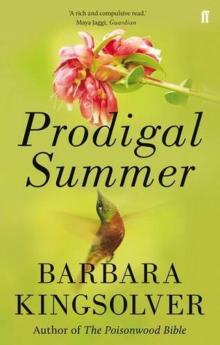 Prodigal Summer: A Novel
Prodigal Summer: A Novel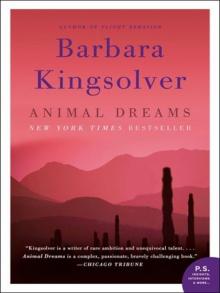 Animal Dreams: A Novel
Animal Dreams: A Novel The Poisonwood Bible
The Poisonwood Bible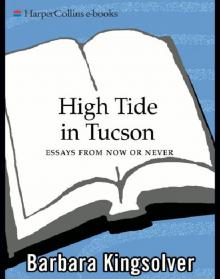 High Tide in Tucson
High Tide in Tucson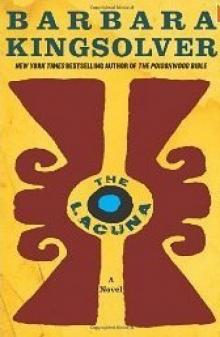 The Lacuna
The Lacuna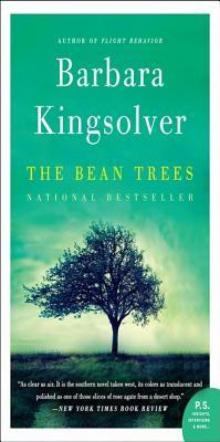 The Bean Trees
The Bean Trees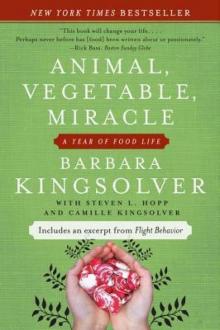 Animal, Vegetable, Miracle: A Year of Food Life
Animal, Vegetable, Miracle: A Year of Food Life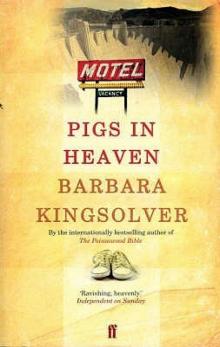 Pigs in Heaven
Pigs in Heaven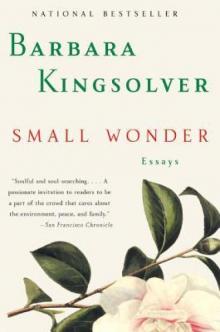 Small Wonder
Small Wonder Flight Behavior
Flight Behavior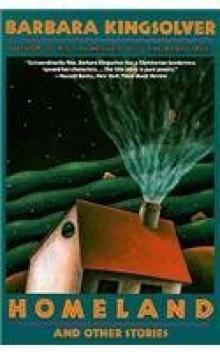 Homeland and Other Stories
Homeland and Other Stories How to Fly (In Ten Thousand Easy Lessons)
How to Fly (In Ten Thousand Easy Lessons) Unsheltered
Unsheltered Animal Dreams
Animal Dreams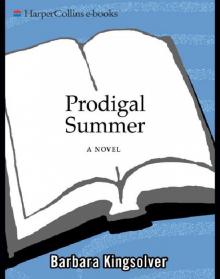 Prodigal Summer
Prodigal Summer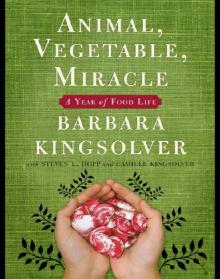 Animal, Vegetable, Miracle
Animal, Vegetable, Miracle